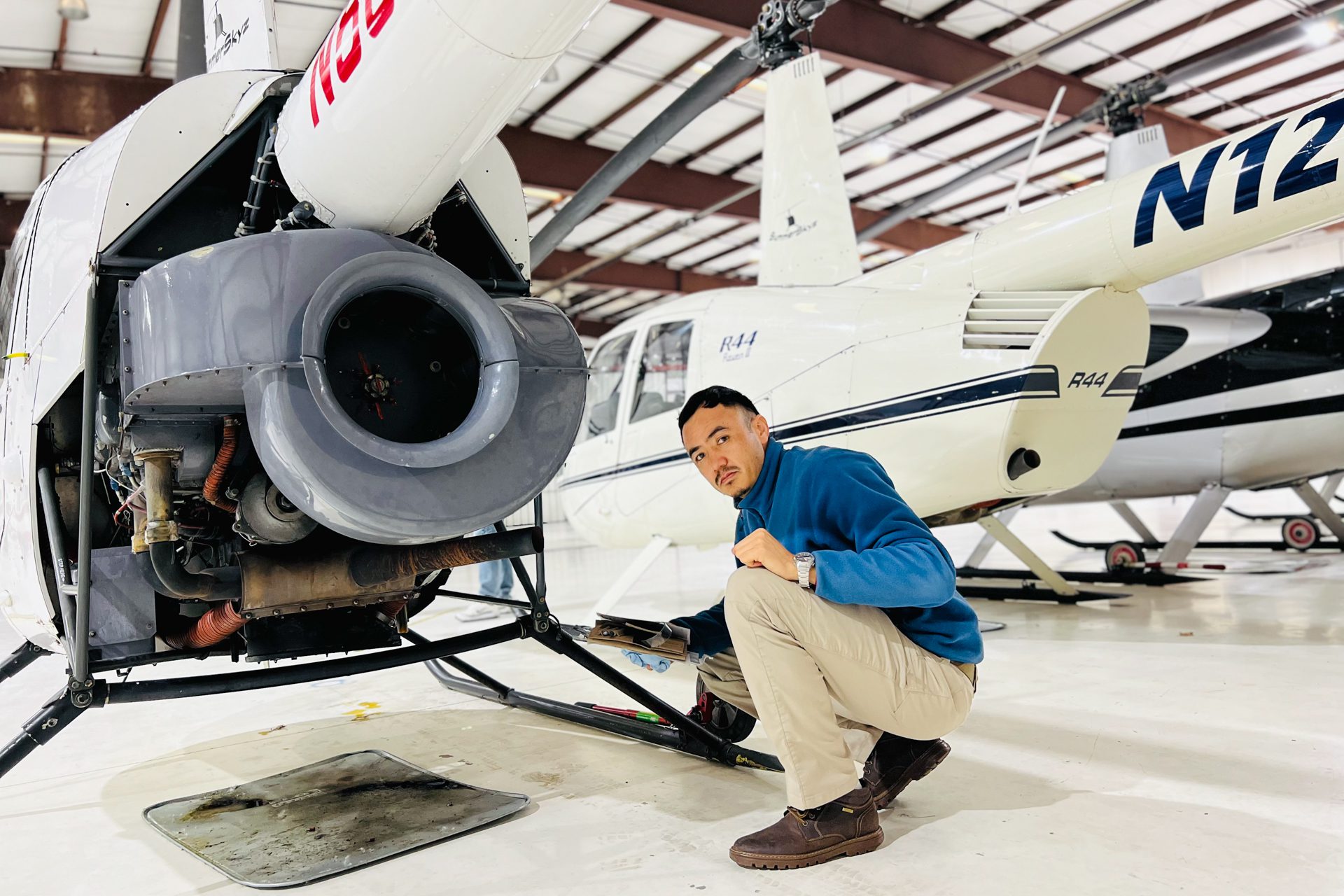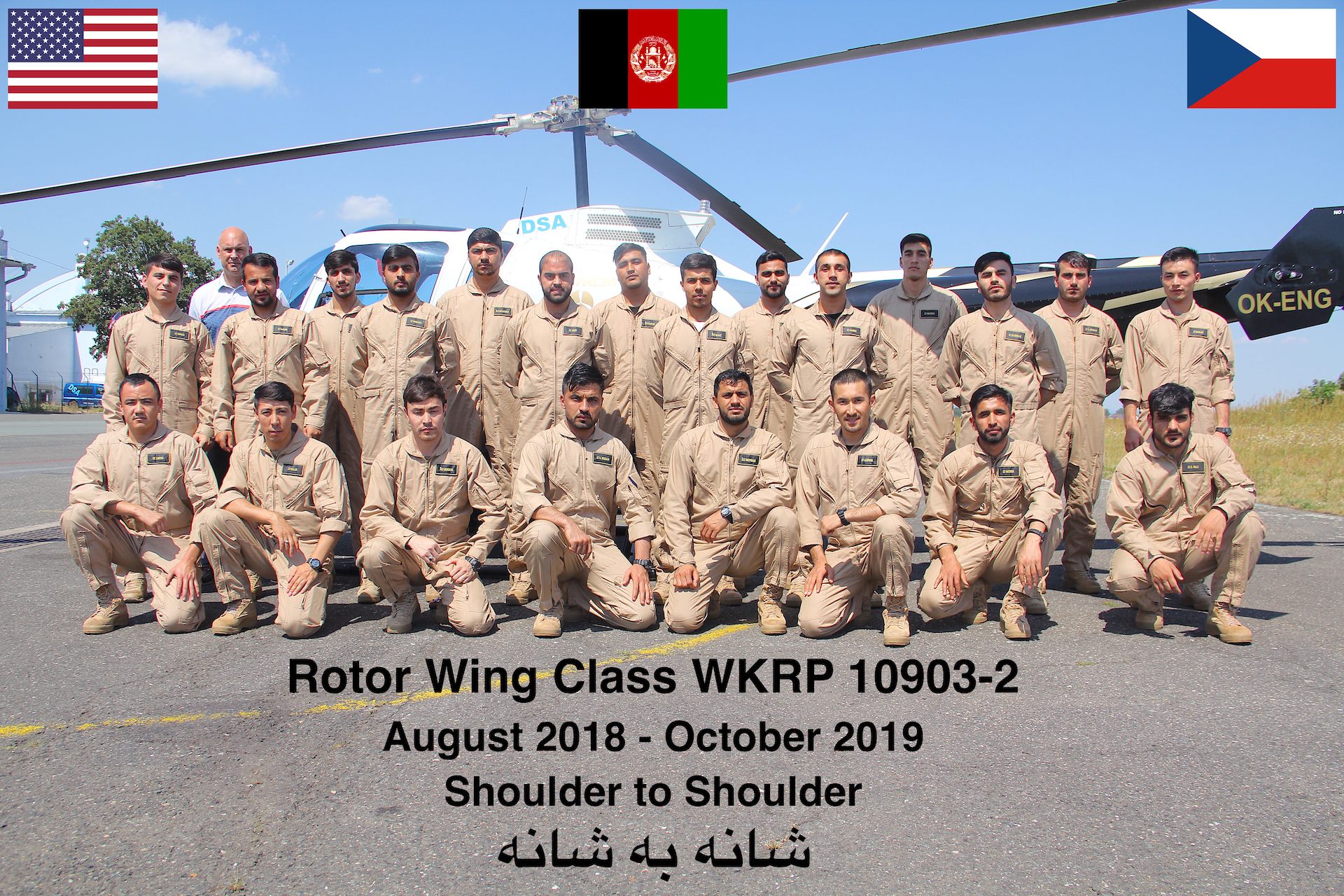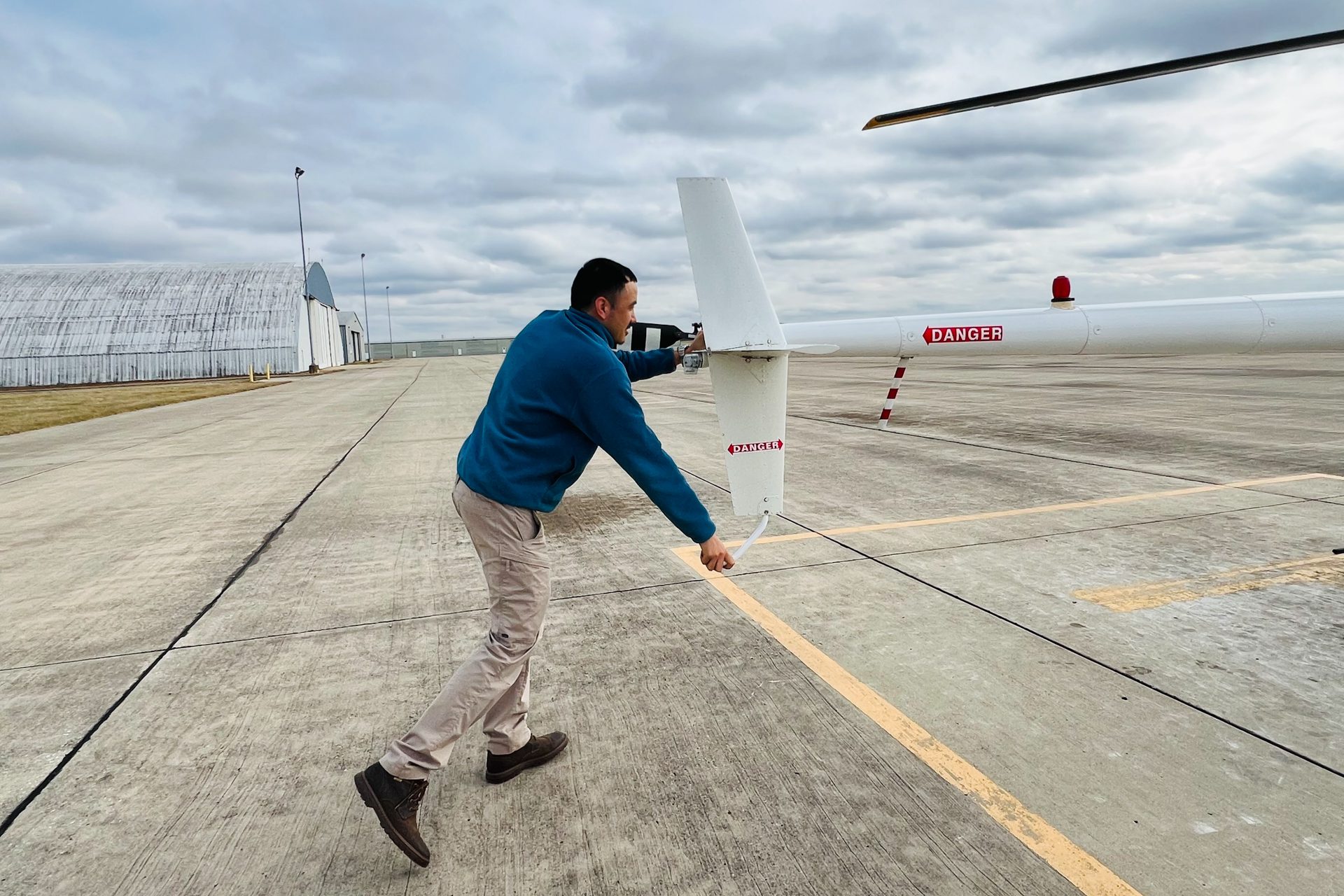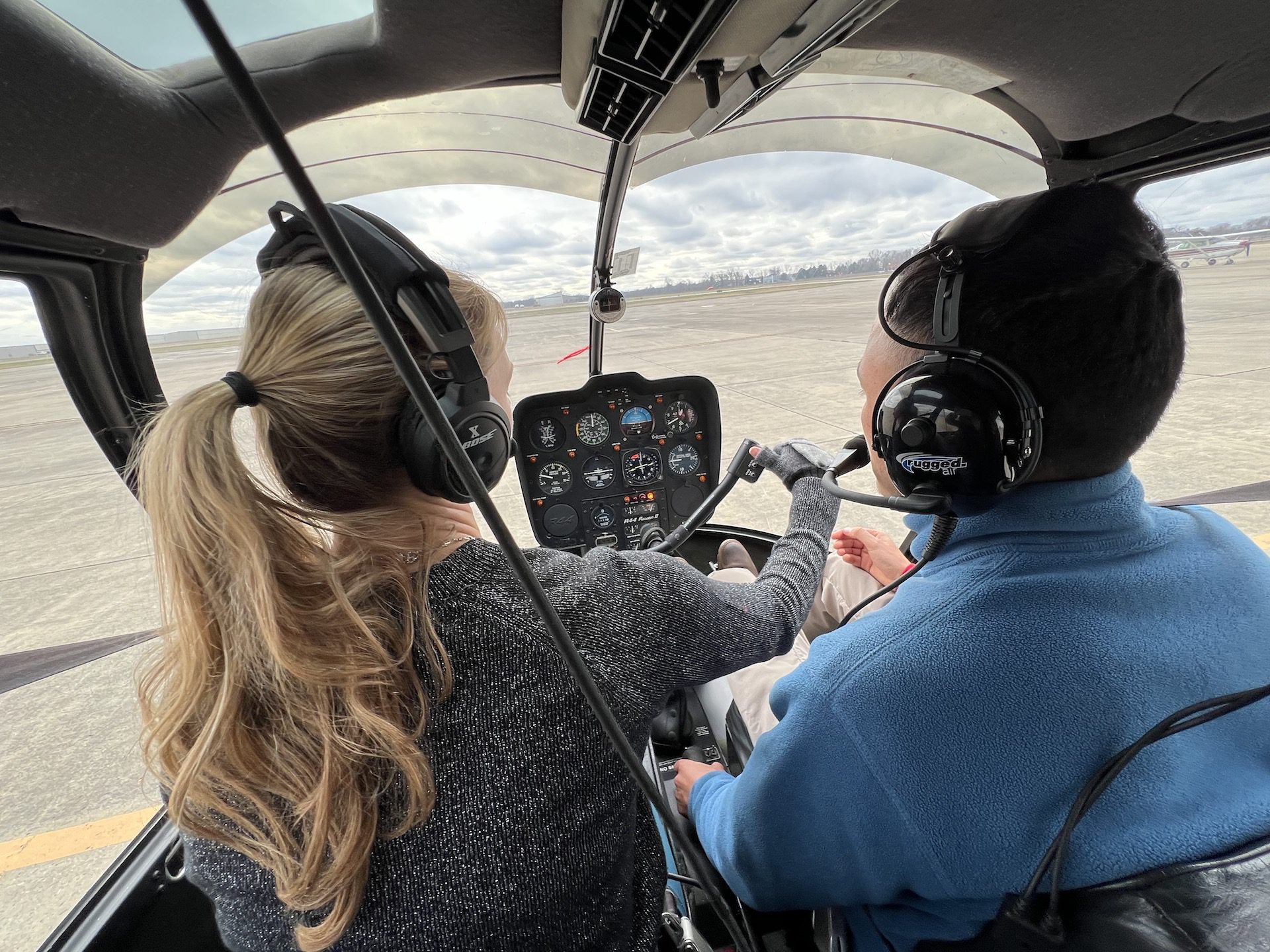 Saleha Soadat for Borderless Magazine
Saleha Soadat for Borderless MagazineNajibullah Amini overcame ethnic discrimination, poverty and the oppressive Taliban regime to pursue his dream of becoming a pilot.
Najibullah Amini’s eyes have always been fixed on the skies.
Since childhood, Amini watched American planes fly overhead and dreamed of becoming a pilot. He hoped he could someday join the United States’ fight against the Taliban.
Want to receive stories like this in your inbox every week?
Sign up for our free newsletter.

“I wanted to feel free like an eagle, leaving behind earthly troubles,” Amini recalls. “From above, I want to address instability and contribute to making the world a better place to live.”
Born in Ghazni Province in southeastern Afghanistan, his dream seemed beyond reach. His family faced poverty, a lack of access to education, ethnic discrimination and government hurdles.
Despite many obstacles, Amini, now 32, completed the Afghanistan Air Force Aviation Academy and advanced training in Europe. But after the fall of the Afghan government in 2021, Amini escaped to the United States, where his dream of becoming a licensed pilot continues at a flight school in Lansing, Illinois.
“When I arrived in Chicago, I looked up at the sky and promised myself that one day I will fly in this sky as well.”
The winding path to the aviation academy
As a child, Amini remembers his family fleeing from the Taliban’s oppressive regime to Quetta, Pakistan, in the late ‘90s. His family was forced into carpet weaving for survival, which meant pausing his education.
In 2002, Amini returned to Afghanistan in the post-Taliban era. He resumed school in his hometown, Nawur District of Ghazni. As the second child in his family, Amini took an active role in earning and managing finances. He juggled night duties as a watchman to support his family and fund his education during the day.
After passing the University Entrance Exam (Concours), a standardized test similar to the American College Test (ACT), he began studying civil engineering at Avicenna University in Kabul in 2013. Three years later, Amini received a call from the Afghanistan Air Force Aviation Academy with an admissions offer. The call was one he had been waiting for.
Read More of Our Coverage
“Piloting is my dream,” Amini said. “During my migration to Pakistan, I was enthusiastic about being a pilot whenever I heard or saw American planes passing through the sky and going to Afghanistan to fight against the Taliban. I thought of myself hoping to be part of that Aviation Squad one day.”
But for many young Afghans, particularly those like Amini who don’t hail from the Pashtun, the largest ethnic group in Afghanistan, this dream remains elusive. Pursuing aviation studies is competitive and often requires the backing of influential government figures in Afghanistan. Amini comes from the Hazara ethnic group that has endured a history marked by ethnic cleansing, unjust taxes, and the pillaging of their homes, according to human rights groups.
“To enter the aviation field, I altered my ethnic and religious identity multiple times on entry forms to qualify for the entry test,” he said.
“An above-average student who needed little guidance.”
Just as Aimini’s dreams were taking off, he suffered a setback with the unexpected death of his father. The passing hit him hard.
Still, Amini started his studies at the Afghanistan Air Force Aviation Academy two days later. But the weight of his father’s grief prevented him from sharing this good news with his family.
“My elder brother, now burdened with family responsibilities after our father’s passing, discovered this news two months later and remarked: ‘You made a big mistake by changing your field of study.'”
But Amini disagreed.
At the Afghanistan Air Force Aviation Academy, Amini dedicated a year to intensive theory and practical aviation studies, specializing in piloting various helicopters. The comprehensive course covered pilot training in multiple helicopters, including the Robinson 4, Enstrom 48, and the Black Hawk.
He finished his studies in Afghanistan and continued his pilot training at the DSA Aviation Academy in Hradec Kralove. After seven months, Amini enhanced his skills by training in Slovakia, where he focused on UH-60A Blackhawk helicopters at the Slovak Training Academy until January 2020. Amini has amassed over 400 flying hours in UH-60A Blackhawk helicopters.

James M. Papp, a retired pilot and senior-level technical and tactical expert of the U.S. Army, served as an instructor and standard pilot in Afghanistan and Iraq. Papp expressed admiration for Amini’s hard work and persistence.
“He graduated as one of my top students, showcasing above-average performance,” Papp said. He was chosen for advanced flight training in the UH-60 (Blackhawk) helicopter and assigned to the Special Mission Wing (SMW-777).”
This unit provides the Afghan Special Security Forces (ASSF) with operational reach and intelligence, surveillance, and reconnaissance capability for counter-terrorism and counter-narcotics missions, Papp said.
“Amini was an above-average student who needed little guidance,” Papp added. “His effective communication with instructors and fellow students and his great attitude led to excellence in all training phases. He was a hardworking and dedicated student, making it a pleasure to work with Najib.”
Papp recalls the impact of learning about Amini’s father’s death when they first met, which prompted him to pay closer attention to Amini’s dedication and determination. Papp acknowledged the discrimination Amini faced because of his ethnic background. “Najib is part of an ethnic minority called the Hazara, historically persecuted and marginalized in Afghan society. Despite adversity, they are a community that values hard work and education. Most of my Hazara students, including Najib Amini, excelled in their training consistently and maintained a good and humble attitude.”
But just as Amini was building his skills, the collapse of the Afghan government in 2021 threatened to derail his dream.
Around 9 a.m. in August 2021, the unit commander informed other pilots in training that the Taliban had entered the city of Kabul, and President Ashraf Ghani had escaped to Uzbekistan. “The only option left was to secure Aviation assets as much as possible, or the Taliban would kill us and misuse aviation equipment,” Amini said.
In a swift and emergency effort, Amini and his fellow pilots executed the evacuation of around 43 fighter helicopters carrying 500 passengers, including 16 high-ranking officials of the former Afghan government, to Uzbekistan. During the evacuation mission, Amini and his colleagues faced a clash with Uzbek aviation fighters in Uzbekistan, leading to their detention.
“After landing at Termez Airport near the border of Afghanistan, the Uzbekistan government detained us for 27 days,” Amini recalled. “I was worried that we would be deported to Afghanistan, ultimately facing the threat of the Taliban.”
U.S. intervention facilitated their release, but Amini’s journey took him to a military camp in Abu Dhabi and later to the U.S.
“Flying…is like polishing my mind.”

On a recent Wednesday, Amini found himself in the cockpit of an R22, soaring thousands of feet above the ground. His instructor offers guidance on navigating the Robinson R22 helicopter. The aircraft is known for its challenges, particularly for beginners. The R22, a small and responsive helicopter, demands high skill and coordination for safe flying.
But Amini is at ease.
After escaping Afghanistan and settling in the U.S. in 2022, Amini revived his dream of earning his pilot license in Illinois.
Michelle Menger, a certified flight instructor and pilot at SummerSkyz Flight School in Lansing, Illinois, reflects on Amini’s ability to adapt quickly. His previous experience has allowed him to smooth the transition with different aircraft like the R22, which often presents a steep learning curve because of its reduced power and absence of auto-stability, requiring some adjustment.
Menger observed Amini’s excellent navigation skills in the initial flights and recognized Amini’s adaptability.
“Amini has experience in a Blackhawk, so switching to a much smaller Robinson 22 Helicopter comes with a learning curve,” Menger said. “With much less power and no auto-stability, the R22 can take some time. Fortunately, he did have some hours in the R22 and R44 before he came to SummerSkyz, so the transition didn’t take too long.”

Much like his childhood, he splits his time between work and training. He drives for a rideshare service to pay for his pilot training at SummerSkyz Flight School. Amini is trying to raise $40,000 to complete his training, which includes a private pilot’s certificate, a Commercial pilot license and an Instrument rating license.
Despite the steep cost, he remains unphased. That’s because he feels the most comfortable in the sky — where he feels he can make a difference.
“Flying for me is like polishing my mind,” Amini said. “Every time I return from the sky to the ground, I feel that my mind is refreshed and ready to face greater challenges and tasks.”

Bring power to immigrant voices!
Our work is made possible thanks to donations from people like you. Support high-quality reporting by making a tax-deductible donation today.
